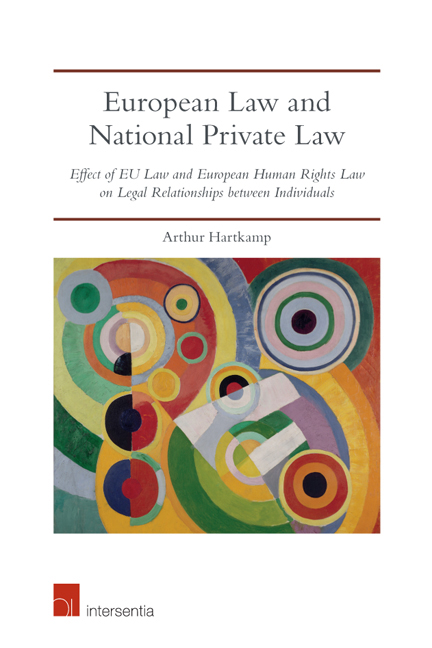 European Law and National Private Law
European Law and National Private Law Book contents
- Frontmatter
- Preface
- Contents
- Table of Cases
- Table of Legislation
- List of Abbreviations
- Part I Sources of European Law and Their Influence on National Private Law
- Chapter 1 Introductory Observations
- Chapter 2 The Tfeu and Private Law
- Chapter 3 General Principles of EU Law and Private Law
- Chapter 4 Directives and Private Law
- Chapter 5 Regulations and Private Law
- Chapter 6 Fundamental Rights and Private Law
- Part II Overview of Directives and Scholarly Projects in General Private Law
- Bibliography
- Index
Chapter 4 - Directives and Private Law
from Part I - Sources of European Law and Their Influence on National Private Law
Published online by Cambridge University Press: 22 September 2018
- Frontmatter
- Preface
- Contents
- Table of Cases
- Table of Legislation
- List of Abbreviations
- Part I Sources of European Law and Their Influence on National Private Law
- Chapter 1 Introductory Observations
- Chapter 2 The Tfeu and Private Law
- Chapter 3 General Principles of EU Law and Private Law
- Chapter 4 Directives and Private Law
- Chapter 5 Regulations and Private Law
- Chapter 6 Fundamental Rights and Private Law
- Part II Overview of Directives and Scholarly Projects in General Private Law
- Bibliography
- Index
Summary
INTRODUCTION
A great deal of European (private) law is embodied in secondary European legislation, that is, in directives and regulations. A regulation ‘shall be binding in its entirety and directly applicable in all Member States’ (Art. 288(2) TFEU). So it has direct effect with respect to anyone to whom it is addressed, regardless of whether it is a public body or an individual. In the wording of the ECJ (Prosciutto di Parma, C-108/01, paragraphs 87–89):
‘a regulation (…) creates not only rights but also obligations for individuals, on which they may rely against other individuals before national courts. Nevertheless, the requirement of legal certainty means that Community rules must enable those concerned to know precisely the extent of the obligations which they impose on them’.
A directive, on the other hand,
‘shall be binding, as to the result to be achieved, upon each Member State to which it is addressed, but shall leave to the national authorities the choice of form and methods’ (Art. 288(3) TFEU).
Regulations will be discussed in the next chapter.
This chapter is devoted to directives in the area of general private law (excluding family law and the law of succession). I will deal in turn with the operation of directives in private law (section 2), with the general aspects of the directives that are relevant to private law (section 3) and with some interpretation issues (section 4). The substance of the directives referred to here is briefly summarised in Chapter 7 (no. 235 ff.).
I will not discuss the possible legal bases for directives in the TFEU. I have only one observation on the subject.
Practically all directives in the area of general private law are based on Article 95 EC (formerly Art. 100A EC, currently Art. 114 TFEU); some older directives (product liability, doorstep selling, commercial agency and consumer credit) are based on Article 94 EC (formerly Art. 100 EC, currently Art. 115 TFEU). These treaty provisions regulate the approximation of such laws, regulations or administrative provisions of the member states ‘as directly affect the establishment or functioning of the internal market’ (Art. 115 TFEU) or as ‘have as their object the establishment and functioning of the internal market’ (Art. 114 TFEU), respectively.
- Type
- Chapter
- Information
- European Law and National Private LawEffect of EU Law and European Human Rights Law on Legal Relationships between Individuals, pp. 135 - 164Publisher: IntersentiaPrint publication year: 2016


